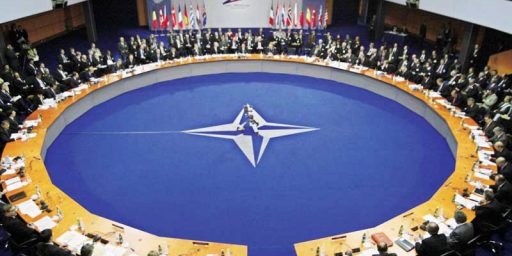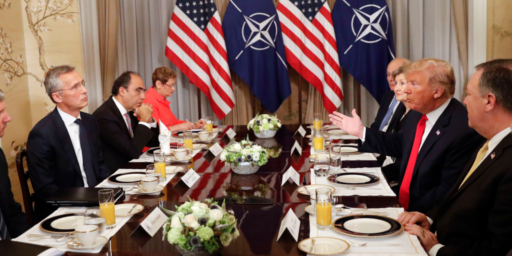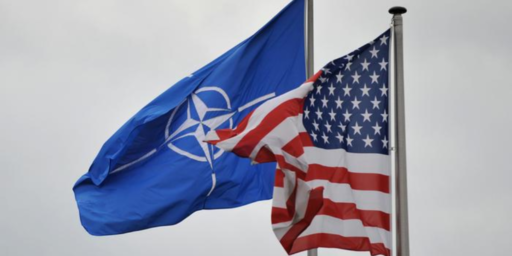NATO’s Mission Creep
Greg Djerejian reacts to a Bloomberg report that NATO is having trouble sustaining its mission in Afghanistan by wondering what NATO is doing there to begin with.
[N]ot a single one of the original signatories in a million years would have imagined half a century on that [the “armed attack against one or more of them in Europe or North America shall be considered an attack against them all”]provision would be invoked to engage in decades-long nation building efforts in the wilds of Kandahar. Don’t get me wrong. Invoking the collective security provision of NATO’s charter— that any attack on a member state would be considered an attack against the entire group of members–was an understandable reaction to the 9/11 attacks. But decimating al-Qaeda’s encampments and capturing its top leadership (which we’ve still failed to do, incredibly) should have been accomplished with exacting, rapid-fire precision–with the alliance than focusing anew on its primary area of responsiblity, which is to say, preservation of stability in Europe and the broader Atlantic Community.
Given the death of the Soviet Union (Fred Thompson aside) and Warsaw Pact–and prodded along by the events of 9/11–NATO is casting about somewhat clumsily for a new role, perhaps akin to some pan-global ‘missionary-style’ force for long-term peace and security. There’s the Partnership for Peace, the Euro-Atlantic Partnership Council, the Individual Partnership Action Plans, not to mention a couple “dialogues” (Mediterranean, Intensified).
This is certainly true so far as it goes. NATO was a collective defense alliance aimed at warding off an attack from the Soviet bloc. That mission was rendered moot in 1991.
The alternatives at that point were either 1) declare victory and disband or 2) figure out how to continue to take advantage of the most effective international security regime in the history of the planet. NATO has been muddling through with the second option ever since.
Now that I’m managing editor of the Atlantic Council, I’m professionally interested in strengthening the transatlantic community. Still, it has long seemed obvious to me that 1) it’s preferable to act in concert with others than alone whenever possible and 2) the United Nations Security Council is seldom an effective collective security tool. Given that the active participation of the United States is the sine qua non of almost any collective military endeavor and that NATO already exists as an operational transnational command and logistics structure, it would seem to be the most logical alternative.
I agree that invoking Article 5 for nation building exercises is problematic. Then again, that’s not what happened. The Alliance correctly identified the Taliban government as the sponsor of an attack on a member nation and authorized military action in response after said government refused to comply with diplomatic demands. NATO quickly decapitated the Taliban and instituted a follow-on government. That was all quite legitimate and well within both the letter and spirit of the North Atlantic Treaty. The subsequent stability operation, though, was well outside the scope of Article 5. It was arguably a prudent follow-on but was and is being treated as optional.
Such matters must be worked out over time. This is, after all, the first time that Article 5 has actually been invoked.






Greg’s barking up the wrong tree here, even if it is with good intentions.
I would hestitate to speak for all Britons, but those I know are all just fine with NATO being involved in Afghanistan. It’s certainly preferable to ad-hoc coalitions of the cajolled with no real standing as internationally approved organisations. Indeed, there’s probably a case to be made for dropping the “North Atlantic” part of the formula and broadening NATO into a Global Treaty Organisation as the de facto arm of the UN for peacekeeping purposes, one any member could call upon for assistance against an attack.
Of course, there’s no way Article Five could have been invoked by NATO in respect of Iraq. There was no Iraqi attack to respond to. That and a lack of UNSC authority help show that the Iraqi invasion itself was an illegal war of belligerence, even if the occupation which followed it has been made legal in international law by a UN mandate. It isn’t impossible that war crimes charges at some future date could note that distinction.
Regards, C